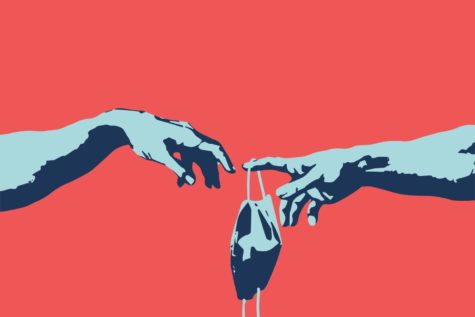OPINION | Omicron outbreak shows mask mandate’s inadequacy

For the third time in two years, Tulane University students are flying home early and resorting to online classes and exams to evacuate a crisis. This time, undergraduate students are apprehensive that the presence of the omicron variant of COVID-19 will ruin their plans to return home for the holidays.
On Dec. 10, President Mike Fitts announced to the Tulane community that the university would reinstate the indoor mask mandate as a precaution against the omicron variant of COVID-19.
When that email was sent, Tulane’s COVID-19 dashboard reported 25 new individuals testing positive. Not even a week later, Tulane reported 279 active COVID-19 cases on campus and 104 new positive tests on Dec. 15, marking a dramatic — although not unprecedented — augmentation from consistently low case numbers this semester.
The university likely enacted the mask mandate to prepare for heightened COVID-19 cases. However, neither a bolstered testing schedule, nor a shift in the marketing of the university’s vaccination program accompanied the announcement.
In a Campus Health email sent out on Dec. 6, Tulane announced that for the remainder of the month, 2,500 randomly selected individuals would be tested daily, so that all individuals would complete a test every seven to 10 days.
During prior COVID-19 case spikes, Tulane required that on-campus undergraduates were tested twice a week, in September 2020, and three times a week, in November 2020. In the latter time frame, the school also imposed restrictions for residence halls experiencing significant case outbreaks and sent out self-check reminders twice a day.
Tulane proved that when as many as 2.7% of the undergraduate population was testing positive, they could plan and implement mechanisms to quickly identify, trace and isolate these cases. A year later, with days left in the semester, Tulane fails to remember the efficacy of their COVID-19 prevention program.
Early data suggests that the omicron variant is even more transmissible than the delta variant, which has been the dominant form of the virus accounting for almost all coronavirus infections in the U.S. Experts also say that omicron contains mutations that may make it somewhat more resistant to available treatments and the body’s immune defenses.
Forty-three infections of the omicron variant were found in the U.S. in the first eight days of December, and the majority of these cases infected young adults under 40. 79% of this sample was fully vaccinated when they tested positive. 32% of this sample had received a booster dose of the vaccine prior to their diagnosis and 14% had previously been infected with COVID-19.
If it is the case that omicron is more transmissible than other variants of the virus and contributes to more breakthrough cases in vaccinated individuals, it is all the more imperative that Tulane increase the frequency of the testing program especially as students prepare to travel home for the holidays.
On Sunday, Dec. 12, the university announced in an email that they would give students the option to complete the remainder of the semester online in the wake of an uptick in COVID-19 cases. It is likely that students are already rearranging travel plans to return home early and as a result, may be traveling while asymptomatically carrying the virus — unbeknownst to them without robust testing in place.
Even more, some students are seeking off-campus testing or are buying at home COVID-19 tests to identify whether it is safe for them to travel or if they risk being quarantined with only a week left in the semester. Consequently, Tulane students might be responsible for fewer available tests for the greater New Orleans population.
The return of the mask mandate is a wise decision on behalf of the university. Still, there are other measures Tulane should be taking during this kind of outbreak in such a crucial moment.
Campus Health has informed the student body that the Centers for Disease Control and Prevention recommends that everyone 18 and older should receive a COVID-19 booster shot when they are eligible, six months after they have received their second dose.
Preliminary lab studies show that three doses of the Pfizer-BioNTech vaccine can offer sufficient protection from disease caused by the omicron variant of COVID-19.
With this information in mind, Tulane should urge, not just recommend, that students get booster shots. While Campus Health currently offers the booster at their Downtown and Uptown vaccine clinics to faculty, students and staff, they should consider creating a vaccine incentive program, similar to the Louisiana Shot for $100 program.
The statewide incentive program, devised by the Louisiana Department of Health, rewards individuals with $100 upon vaccination at participating locations. The program was recently extended until Dec. 31 and includes financial incentives for students eligible for their booster shot.
A Harvard Medical School study concluded that, according to the psychology of how individuals make economic and health decisions, vaccine incentive programs result in a higher immunization uptake. Students would likely be responsive to cash financial incentives or the prospect of a prize in the form of Wavebuck$ or Nolabuck$.
For the first time in a long time, Tulane students experienced an air of normalcy in the last few months as the indoor-mask mandate was lifted in the absence of high numbers of recorded COVID-19 cases.
If Tulane has any interest in maintaining this environment, they must consider implementing safeguards that will be effective in preventing future COVID-19 outbreaks on campus. It is troubling that Tulane knows how to do this but acts as though the mask mandate is a “Hail Mary” response to the most recent outbreak.
The university’s actions play a role in ensuring that students and their families are safe, healthy and calm. Tulane wrongs our community if they believe that modest COVID-19 precautions suffice for real solutions in moments of chaos.
Your donation will support the student journalists of Tulane University. Your contribution will allow us to purchase equipment and cover our annual website hosting costs.



